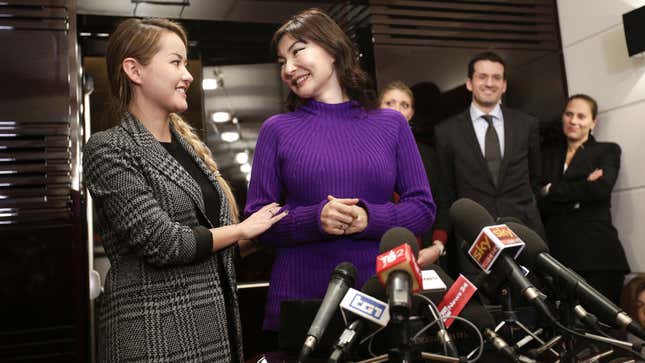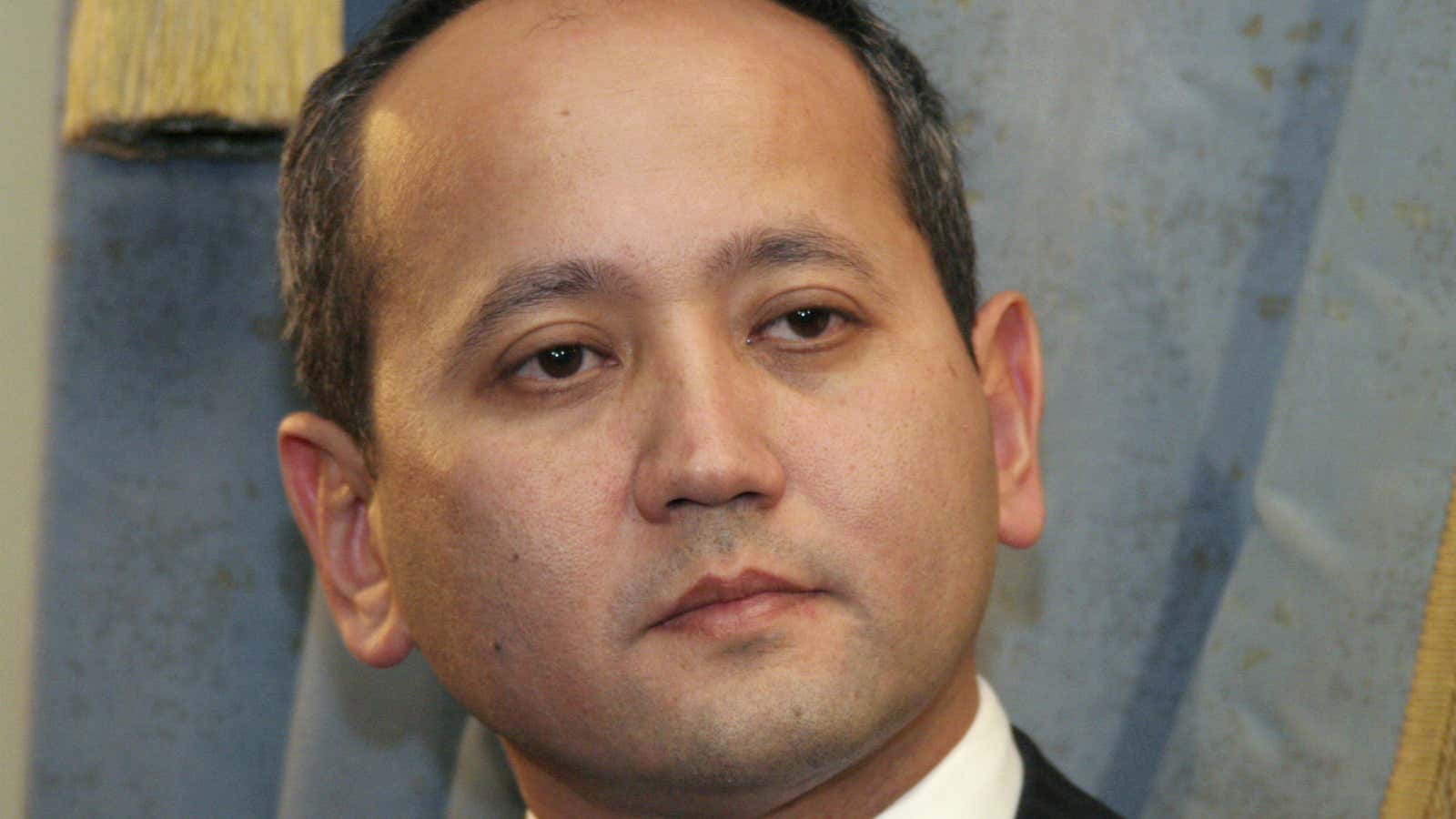Four years ago, Kazakhstan took control of the private BTA Bank, sending its sacked chairman fleeing to London and unraveling what was allegedly one of Europe’s biggest financial frauds. Along the way, private investigators unearthed some 1,000 shell companies allegedly used by Mukhtar Ablyazov to hide $6 billion in stolen bank assets and cash. Ablyazov himself was eventually tracked down on the French Riviera, spotted through a villa window, clad only in underwear, arranging lilies on a bed while awaiting his mistress. Days later, French commandos disguised as gardeners arrested him.
On Jan. 9, a French judge ordered Ablyazov extradited to Russia to face fraud charges. His lawyers say they will appeal, claiming their client is a misunderstood political dissident who is not guilty of any crime, but he meanwhile sits in an Aix-en-Provence prison.
Ablyazov, a former Kazakh Energy Minister with a degree in physics, now seems to have no more than a slim chance of avoiding prosecution and a prison sentence. But according to his native country’s best-known political exile, the main reason that Ablyazov seems at risk of losing his freedom is not necessarily his behavior as BTA’s chairman—it is his refusal to follow the invisible rules that govern certain dissidents-in-exile.
Having sought asylum in the UK, Ablyazov had to meticulously adhere to this informal yet nonetheless compulsory code covering exceedingly wealthy individuals, often from oil and mining nations, who flee to the West. “Mukhtar’s problem is what he did in the UK, not what he did in Kazakhstan,” former Kazakhstan prime minister Akezhan Kazhegeldin told Quartz.
Ablyazov rightly chose London when he fled
London has been a destination for political exiles for centuries. Just in the last hundred years, it hosted King Zog of Albania, Ethiopian Emperor Haile Selassie and France’s Charles de Gaulle. Today, it is among the favorite landing place for those keeping their distance from Russian president Vladimir Putin: Chechen prime minister-in-exile Ahmad Zakayev lives there, as did the late Russian oligarch Boris Berezovsky.
It is also home to Kazhegeldin, perhaps the world’s greatest authority on remaining safe and free after angering Nursultan Nazarbayev, Kazakhstan’s powerful president. In 1998, Kazhegeldin fled to the UK after a failed, naïve campaign to unseat Nazarbayev. Kazakhstan attempted unsuccessfully over the years to nab him in Russia, Italy, the UK and elsewhere, and now seems to have stopped trying.
When Ablyazov’s crisis struck in 2009, Kazhegeldin said he informed him of the main rule of the road for exile in the UK, which is to come clean. “You must prove” your bona fides as an honest businessman, he says he told Ablyazov. Kazakhstan authorities would go after him, but Ablyazov could “use this fortress, the UK justice system,” in his favor.
Ablyazov instead attempted to deflect BTA’s initial legal attacks with delaying tactics including appeals, and meanwhile went on the political offensive with a fierce attack against Nazarbayev and his family. “I am the victim of a continuing oppressive and illegal scheme by the Kazakhstan authorities, the purpose of which is to expropriate my assets and to eliminate me as a political force,” Ablyazov told a London court in November 2010.
There is a basis for this defense in a history of powerful Kazakhstan officials demanding and obtaining large shares of businessmen’s assets in return for allowing them to continue making money. And Ablyazov’s assumption of the opposition mantle went all right for awhile. “Living in Fear in London,” was the headline on a favorable piece in the Evening Standard. The Economist ran a sinister account of the authorities hounding Ablyazov under the dark headline, “Knock on the Door.”
But BTA, with seemingly limitless financial resources, hired an estimated 100 lawyers, in addition to forensic investigators and private spooks from Diligence, a firm founded by former US and UK spies. They spent the last four years tailing people known to be close to Ablyazov, along the way finding hidden boxes of documents that unraveled an extraordinarily intricate web of shell companies controlled by the tycoon. In a series of 11 UK lawsuits, BTA lawyers alleged that Ablyazov’s modus operandi was to lend money to a shell company and then fail to pay all of it back. In all, the sums amounted to at least $6 billion, BTA claimed.
The suits were sufficiently compelling to win a 2009 court order freezing and compelling disclosure of his assets.
Another rule for exiles: you must be likeable
In the years that followed, Ablyazov kept getting into political collisions. A prime difficulty was that, while he had dabbled in opposition politics over the years and even went to prison for a year, he, unlike Kazhegeldin, had never mastered the art of geniality, another essential quality common to successful exiles. To many of those who have met him, Ablyazov seems like a cool and slippery opportunist. Canadian mining magnate Frank Guistra, whose Kazakh wheeling-and-dealing ensnared Bill Clinton in a 2008 New York Times investigative piece, described negotiations with Ablyazov as “the most stressful in my life.”
In court, these traits made Ablyazov seem evasive and acquisitive rather than an honest steward of bank assets. So it was that in February 2012, a High Court justice, examining evidence of hidden assets in Cyprus and elsewhere, ruled Ablyazov in contempt of court for “deliberate and brazen” violation of the 2009 asset freeze, and sentenced him to 22 months in prison.
Rejecting Ablyazov’s subsequent appeal, a London judge wrote, “It is difficult to imagine a party to commercial litigation who has acted with more cynicism, opportunism and deviousness towards court orders than Mr. Ablyazov.”
Between the conviction and the actual sentencing, Ablyazov fled. Despite having surrendered his passport to the London court, he had a spare diplomatic passport issued by the Central African Republic that identified him as “Marat Ayan.”
That was Ablyazov’s fatal mistake, according to Kazhegeldin: “He is behaving like a criminal, unfortunately.”
The hunt begins
After Ablyazov fled the UK, the BTA team continued to stalk him. Seventeen months later, they tracked him down to three rented villas dispersed around Cannes. They got there by following Olena Tyshchenko, a gorgeous (and married) Ukrainian lawyer with whom he appeared to be carrying on an affair. They tipped off French authorities, who, in one of the strangest episodes in the case, marshaled a SWAT team consisting of a plane, armored vehicles and commandos.
The BTA lawyers had somehow persuaded French prosecutors that Ablyazov was dangerous and guarded by a private army—an almost laughable notion for those familiar with a mousy tycoon who, while a tough negotiator, is not given to gangsterish displays. In any case, improvising on the fly, the commandos grabbed some gardeners who were leaving the villa, swapped clothing with them, and arrested Ablyazov peacefully on July 31 while he was working at a home computer. But they probably would have achieved the same resigned surrender with a single officer and the words, “Come with me.”
The last resort: public opinion
With the courts and police apparently on their side, the BTA team now went after his last refuge—the court of Western public opinion, which is often sympathetic to those claiming oppression at home. This point is crucial because, in order to be actually carried out, any extradition order must be signed by Prime Minister Jean-Marc Ayrault, who will be sensitive to local and international opinion. Getting the public on your side is perhaps the most important asset for a dissident-in-exile.

After the inelegant Ablyazov trotted out his photogenic wife Alma and daughter Madina (pictured above) before photographers and reporters, empathetic coverage followed. But the BTA team struck back with a masterful courtship of influential media outlets, dishing out morsels of the tantalizing material that they had been collecting over the last four years.
The disclosures were perfectly timed: In the days before the French extradition order was issued, a remarkable series of investigative accounts appeared, which tended to glorify the BTA team and tarnish Ablyazov. Bloomberg published a breathless account of BTA breaking “the biggest financial fraud case since Bernard Madoff’s $17 billion Ponzi scheme.” The BTA team included “a donnish Briton who peppers his conversation with quotes from Virgil and Voltaire” and another who “races sports cars in his spare time.” Meanwhile, Euromoney described the stakeout at the seafront villa south of Cannes, at which, through sheer curtains, BTA’s private eyes spied Ablyazov preparing flowers and a bed for Tyshchenko’s arrival.
There were not just stories and documents but photos to dress up the accounts: For The Wall Street Journal, the bank provided a photograph of the comely Tyshchenko, clad in a snug and fashionable dress, snapped surreptitiously after she testified in the London case.
On Jan. 9, the court in Aix-en-Provence approved extradition requests by both Russia and Ukraine. It said it favored Russia, which alleges $5 billion in fraud while Ukraine’s complaint is for $400 million.
BTA’s successes notwithstanding, Kazakhstan has a ways to go. Ablyazov’s lawyers have appealed the UK rulings to the European Court of Human Rights in Strasbourg, France. Amnesty International and Human Rights Watch are publicly opposing any extradition, casting reasonable doubt on the chance of a fair trial in Russia or Ukraine, and the possibility of rough treatment if Ablyazov is ultimately handed on to Kazakhstan. One estimate is that it may be a year before BTA is in a position to recover the billions it claims to have lost.
